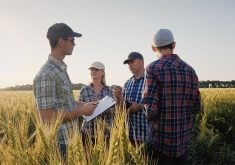In 2023, the Canadian Bar Association reported that $53 billion worth of land is expected to change hands as farmers retire over the next decade. Despite this, 88 per cent of farms lack written succession plans, and by 2033, 40 per cent of Canadian farmers will retire, marking a significant transition in Canadian agriculture.
Additionally, the Farm Credit Canada’s Farmland Values Report indicated an 11.5 per cent increase in the average value of cultivated land across Canada in 2023, the second-highest rise reported since 2014.
This substantial, often unearned, accumulation of wealth adds layers of complexity to land values, inflation, business models and tax considerations, further complicated by increasing family sizes and the need for farms to sustain more people. Extended families farming together add complexity to corporate, partnership and succession structures, with all parties interested in the farm’s success and way of life.
Read Also

Invigor Gold variety viewed as threat to condiment mustard
Invigor Gold, the canola-quality mustard developed by BASF, is on a collision course with Canada’s condiment mustard industry. It’s difficult to see how the two can co-exist.
Given the accumulated wealth in farm businesses and the involvement of multiple families, it is crucial to discuss the future of the business and the next generation’s role in it. These discussions affect both the legacy business and the farm family, particularly as families include members who are actively involved, passively involved or not involved at all.
The future farmer faces a dynamic landscape regarding wealth creation, preservation and capital allocation. Farm family wealth has been closely tied to the legacy business, but in today’s volatile environment, farm families should consider reducing their risk and diversifying their wealth.
Historically, farm families did not consider the impact of wealth accrual within the farm and family. However, the rapid increase in land values has made wealth accrual a significant consideration in succession planning.
In some cases, the current generation would like the upcoming generation to appreciate the wealth and understand the sacrifices made to achieve it. Documenting the farm’s history and including it in the strategic plan, along with capturing stories in videos, can help ensure the legacy is shared from one generation to the next.
However, even if the upcoming generation understands the history and appreciates the wealth, that incoming group may choose different career paths. Families can still pass along the enterprising spirit without the next generation working on the farm, but it raises questions about the legacy business’s funding and priorities.
Understanding the long-term economic outlook of the farm is crucial. FCC’s report predicts that the farmland affordability index will deteriorate in 2024, with farm cash receipts projected to decline by 3.2 per cent.
Long-term financial modelling could help farmers understand the farm’s future financial position and align it with the family’s succession plan. This modelling promotes active communication within the farming family, fostering an understanding of the wealth accrued and avoiding complacency.
In the case of farm family succession, farmers must balance investment and operations to maximize land value. Farm businesses must achieve strong performance and keep the family committed to ownership.
Five dimensions must work in synchrony: harmonious family relations, a supportive ownership structure, strong governance, professional wealth management, and should you have established such wealth, consideration for charitable foundations.
Developing the future farmer in a family succession model involves more than learning about the farm’s history. It requires the outgoing generation to have clearly communicated their succession desires sooner rather than later.
During the 24th Congress of the International Farm Management Association held recently in Saskatoon, advisers said the incoming generation should be involved in farm family meetings as well as business meetings starting at the age of 15. Their participation will help them appreciate the farm’s history and the outgoing generation’s vision while developing their own knowledge, skills and abilities about how to engage in the operations.
Having the incoming generation engage with peers and advisers, while developing broad business and financial acumen, as well as participating in the creation of strategic plan are essential for the future farmer.
Josée Lemoine, CMC, is a farm management consultant with Backswath Management Inc. She can be reached at 204-770-3811 or josee.lemoine@backswath.com.















